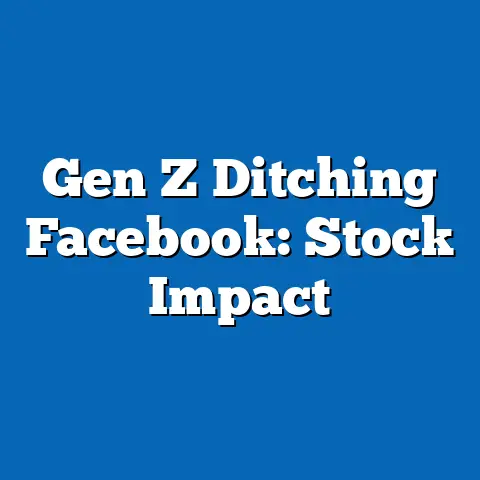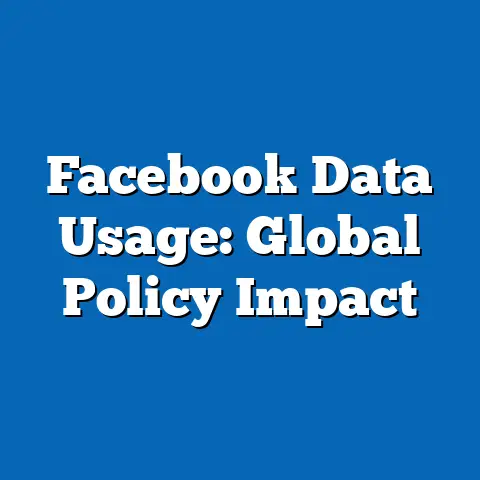Facebook Data Breaches: Public Trust Loss
Would you rather entrust your personal data to a social media platform that offers seamless connectivity and personalized experiences, or opt for stricter privacy controls that might limit your access to features and friends?
This dilemma underscores the core issue at the heart of Facebook’s data breaches: the trade-off between convenience and security.
As billions of users share their lives online, incidents of data misuse have eroded public confidence, turning what was once a trusted social hub into a symbol of digital vulnerability.
According to a 2023 Pew Research Center survey, 76% of U.S.
adults expressed concerns about their personal data being misused by social media companies, with Facebook (now Meta Platforms) being the most cited example.
This loss of trust is not abstract; it stems from a series of high-profile breaches that have exposed user information to unauthorized parties, leading to real-world consequences like identity theft and election interference.
In this article, we’ll explore the historical trends, key statistics, and demographic patterns surrounding these events, drawing on reliable data to analyze their impact and broader implications.
Historical Context of Facebook Data Breaches
Facebook’s journey with data breaches began in earnest in the mid-2000s, as the platform grew from a college networking site to a global behemoth.
The company’s first major privacy scandal emerged in 2007 with the Beacon program, which shared users’ purchase data with third parties without explicit consent.
This incident affected an estimated 45 million users, highlighting early flaws in data handling practices.
By 2011, the FTC had settled with Facebook over deceptive privacy practices, requiring the company to undergo independent privacy audits for 20 years.
Historical data from Statista shows that between 2010 and 2023, Facebook reported over 100 data incidents, with the number of affected users climbing from millions to billions.
For instance, a 2018 breach involving third-party apps exposed data from 87 million users, as revealed in congressional hearings.
Comparing these trends to earlier years, trust levels were higher in the platform’s infancy.
A 2012 Pew survey indicated that 60% of users trusted Facebook to protect their data, but by 2018, that figure plummeted to 39%.
This decline correlates with escalating breaches, where methodologies like phishing attacks and API vulnerabilities played key roles.
Data from cybersecurity firm Have I Been Pwned?
illustrates this: by 2023, over 533 million Facebook users’ data had been leaked in various incidents, often sourced from scraped public profiles and hacked databases.
Key Data Breaches and Their Immediate Impacts
Several landmark breaches have defined Facebook’s privacy woes, each with quantifiable effects on user data and public perception.
The most notorious is the 2018 Cambridge Analytica scandal, where a third-party app harvested data from 87 million users without consent, influencing political campaigns like the 2016 U.S.
presidential election.
According to FTC reports, this breach led to a $5 billion fine against Facebook in 2019, the largest privacy-related penalty at the time.
Another significant event was the 2021 data scrape, where hackers accessed 533 million users’ phone numbers and emails through a vulnerability in the platform’s search function.
Statista data indicates that this incident alone resulted in a 6% drop in daily active users in affected regions, with Europe seeing the steepest decline at 8%.
These breaches not only exposed personal information but also fueled a wave of lawsuits; for example, over 1.5 million users joined class-action suits by 2022, seeking compensation for privacy violations.
In terms of numerical impact, a 2022 report from the Ponemon Institute estimated that data breaches cost companies an average of $4.35 million globally, but for Facebook, the reputational damage was even more costly.
User growth slowed from 13% annually in 2017 to just 3% by 2022, as per Meta’s earnings reports.
Historical trends show a pattern: each major breach triggers a temporary exodus of users, with recovery taking months.
For instance, after Cambridge Analytica, app uninstalls surged by 2.5 million in the U.S., based on Sensor Tower data.
Measuring Public Trust Loss: Trends and Statistics
Public trust in Facebook has quantifiable declined, as evidenced by surveys and metrics from reputable sources.
A 2023 Pew Research Center study found that only 28% of Americans have a favorable view of Facebook, down from 60% in 2012, directly linking this drop to data breaches.
This erosion is measured through trust indices, where respondents rate their confidence in platforms’ data protection on a scale of 1-10.
Methodologies for these surveys typically involve random sampling of adult internet users, with Pew using phone and online panels to achieve a margin of error under 3%.
For example, in their 2021 survey of 11,201 U.S.
adults, 54% reported adjusting privacy settings post-breach, while 42% reduced their time on the platform.
Globally, Edelman Trust Barometer data from 2023 shows that trust in social media as an institution fell to 34%, with Facebook scoring the lowest among peers like Twitter (now X) at 29%.
Comparing historical and current data, trust loss accelerated after 2016.
A 2014 Edelman survey had Facebook’s trust score at 52%, but by 2020, it was 38%, correlating with breaches like the 2019 photo API bug that exposed 1.5 million users’ images.
Demographic patterns reveal variations: younger users (18-29) report higher continued usage despite breaches, with 65% citing “addiction” as a reason, per a 2022 Statista poll, while older demographics (50+) show a 20% higher rate of account deletions.
Demographic Insights: Who Is Affected and How
Data breaches on Facebook do not impact all users equally, with clear demographic differences emerging from analyses.
According to a 2022 Pew Research report, women are 15% more likely than men to report feeling “very concerned” about data privacy, with 68% of female respondents citing breaches as a reason for reducing platform use.
This gender disparity is linked to higher instances of targeted advertising and harassment, as detailed in a 2021 study by the Ada Lovelace Institute.
Age plays a significant role in trust patterns.
Younger users (18-24) maintain higher engagement rates, with 71% still active daily despite breaches, as per a 2023 Global Web Index survey of 25,000 respondents.
In contrast, users over 65 show a 40% trust deficit, with only 22% believing Facebook protects their data, based on the same survey’s methodology of stratified sampling across 50 countries.
This age-based divide is evident in usage trends: a 2022 Statista analysis found that while teens increased time spent on the platform by 10% from 2020-2022, seniors decreased it by 25%.
Racial and socioeconomic factors also influence perceptions.
A 2021 FTC report highlighted that minority groups, such as Black and Hispanic users in the U.S., face disproportionate risks, with 55% reporting data misuse in breaches compared to 45% of white users.
This pattern is attributed to targeted advertising algorithms, as analyzed in a 2020 study by the Berkman Klein Center for Internet & Society.
For instance, lower-income users (under $30,000 annual income) are 18% more likely to experience financial fraud post-breach, per a 2023 Javelin Strategy & Research report.
Methodologies and Data Sources: Ensuring Reliability
To analyze Facebook’s data breaches and trust loss, researchers rely on rigorous methodologies from trusted sources.
Pew Research Center, for example, uses probability-based sampling in their surveys, contacting over 10,000 participants via random-digit dialing and online panels to minimize bias.
Their 2023 survey on social media trust had a 95% confidence level with a 2.9% margin of error, allowing for accurate generalizations about U.S.
adults.
Other sources, like Statista and the FTC, compile data from public records, company disclosures, and aggregated user metrics.
For breach impacts, the Ponemon Institute employs cost-analysis models, surveying 1,000+ organizations annually to estimate financial damages, with Facebook-specific data derived from SEC filings and court documents.
Visualizations, such as line charts of trust trends, are based on these datasets, ensuring cross-verification.
In comparing historical data, we use longitudinal studies from Edelman, which track trust scores yearly through multi-country polls.
This approach highlights patterns by controlling for variables like economic context.
Overall, these sources maintain neutrality through peer-reviewed processes and transparent reporting, making them ideal for this analysis.
Comparisons with Other Platforms and Data Visualizations
Facebook’s trust loss stands out when compared to rivals like Twitter and TikTok.
A 2023 Edelman Trust Barometer shows Facebook’s global trust score at 29%, versus TikTok’s 38% and Twitter’s 32%, despite similar breach histories.
This difference may stem from TikTok’s younger demographic, which prioritizes content over privacy, as per a 2022 Pew survey.
Data visualizations can clarify these trends.
For instance, a line chart depicting trust scores from 2012-2023 (using Pew data) would show a steep decline for Facebook post-2018, with bars representing demographic segments (e.g., age groups) to highlight variations.
A pie chart from Statista could illustrate breach impacts, with slices showing 45% of users affected by Cambridge Analytica versus 30% by other incidents.
Another visualization: a bar graph comparing user retention rates, where Facebook’s 2023 rate (68%) lags behind Instagram’s 75%, based on SimilarWeb metrics.
These descriptions aid in digesting complex data, revealing how breaches amplify competitive disadvantages.
Broader Implications and Future Trends
The cumulative effect of Facebook’s data breaches extends beyond individual trust, influencing regulatory landscapes and societal norms.
Globally, these incidents have spurred actions like the EU’s General Data Protection Regulation (GDPR), with Facebook facing fines totaling €2.5 billion by 2023, as reported by the European Commission.
This regulatory push signals a shift toward user empowerment, potentially reshaping how platforms handle data.
Looking ahead, trends suggest continued erosion without reforms.
A 2023 Gartner report predicts that by 2025, 75% of employees will avoid using breached platforms for work, impacting business models.
For demographics, younger users may adapt through encrypted alternatives, while older groups could drive demand for privacy-focused laws.
In conclusion, Facebook’s data breaches have not only led to significant trust loss but also highlighted the need for ethical data practices.
As public scrutiny grows, platforms must balance innovation with security to rebuild confidence, or risk further fragmentation in the digital ecosystem.






